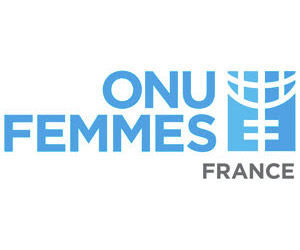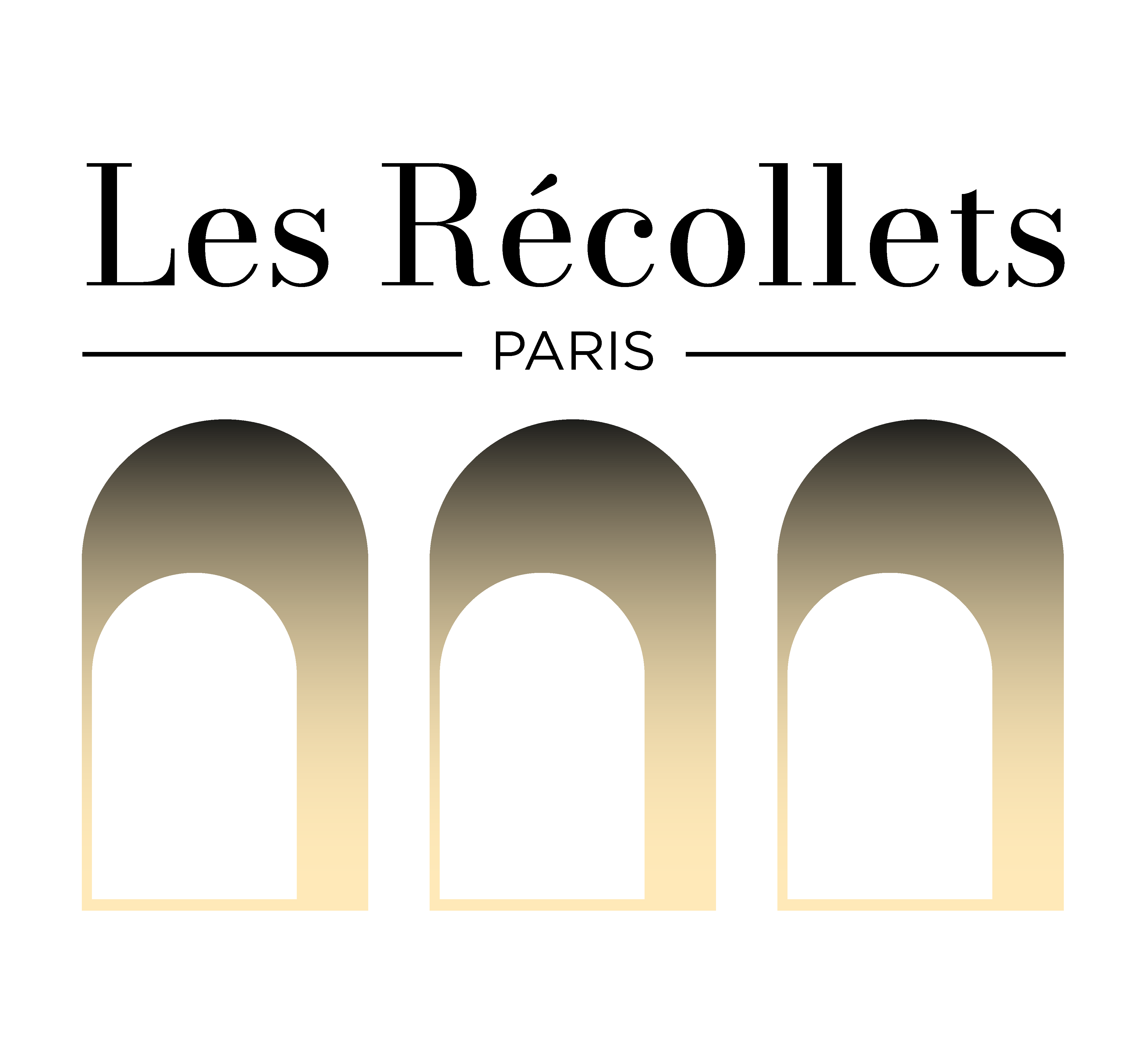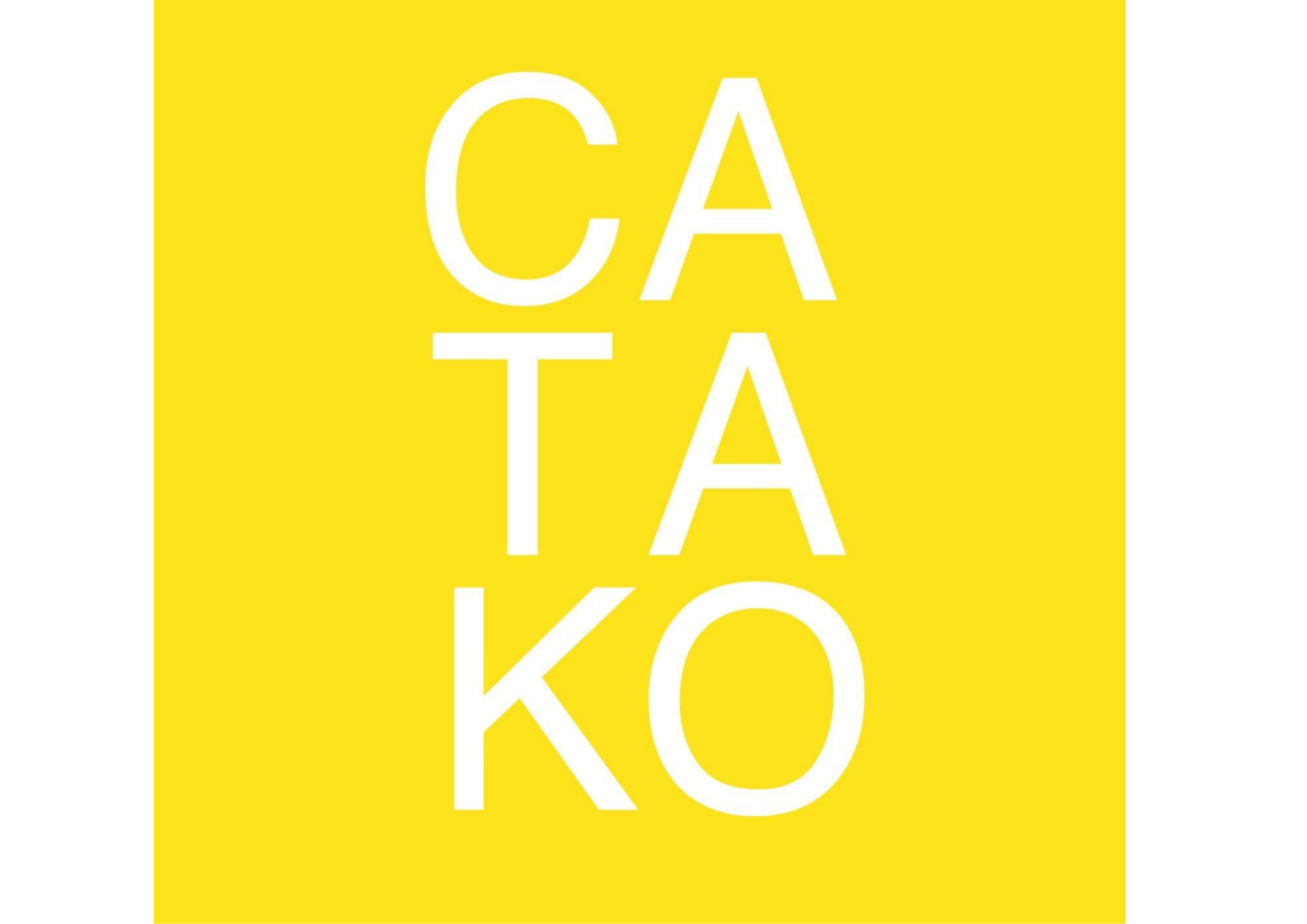Marylise Vigneau
French, lives in Retz, Austria
Edition 2018 - Finalist
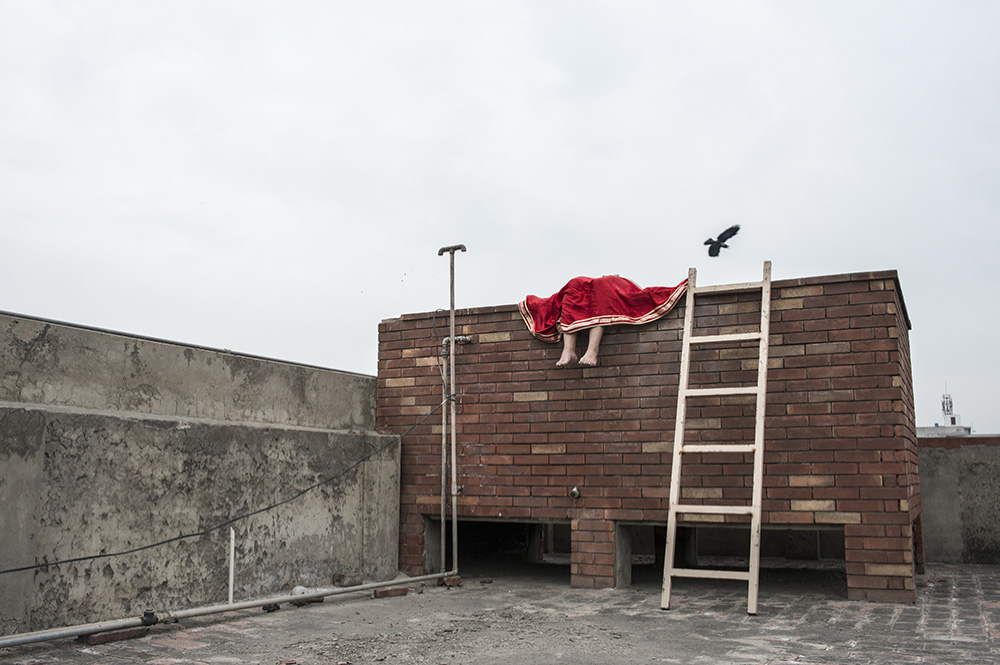
ARTICLE 19
The article 19 of the constitution of the Islamic Republic of Pakistan says:
“Freedom of speech: Every citizen shall have the right to freedom of speech and expression, and there shall be freedom of the press , subject to any reasonable restrictions imposed by law in the interest of the glory of Islam or the integrity, security or defence of Pakistan or any part thereof, friendly relations with foreign States, public order, decency or morality, or in relation to contempt of court, commission of or incitement to an offence. ”
These “reasonable” restrictions have often been exploited against different groups of people such as minorities, journalists, human rights activists, atheists, homosexuals, etc. They are interpreted as a freedom to disregard others’ faiths, perceptions, sexuality and opinions. They produce outcasts. Status quo, ruling alliances and so-called decency build a wall around these fabricated pariahs and silence them. In the recent years, the enforcement of Pakistan’s blasphemy and criminal defamation laws remain a significant concern, as well as new laws to extend controls over the right to freedom of expression online. Killings and attacks on journalists, media workers and human rights defenders remain endemic and characterized by ongoing impunity.
This story takes place in Lahore and constitutes a series of portraits of people whose way of thinking, living, loving, is obviously against the official Pakistani narrative. People whose life is a fight because they have to hide their opinion, their beliefs or lack thereof, their sexuality, their art, their concerns, joys or sorrows.
After long conversations, these images have been carefully staged to respect the safety and therefore the anonymity of the people pictured. Each of them is named « Noor », a name that means light and is used indifferently for women and men. This series is ongoing.
This work is dedicated to the memory of Asma Jahangir, a Pakistani lawyer who dedicated her life to defending minorities and died in Lahore on February 10, 2018.
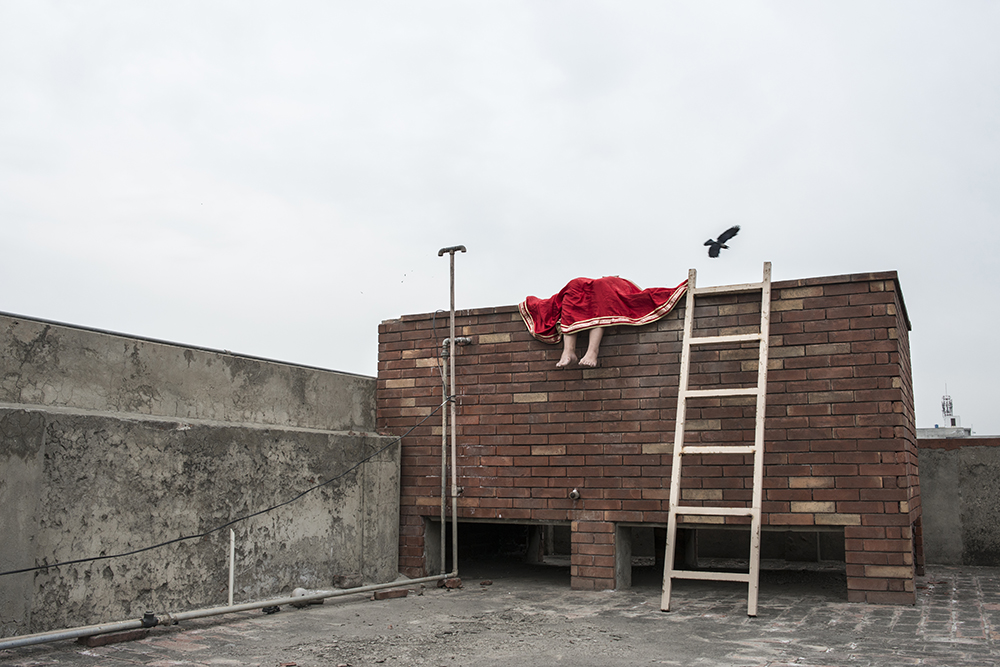
PAKISTAN / Lahore / 2017 / Noor is an Ahmadi, which means that since childhood she has known that she needs to conceal this part of her identity in order to avoid verbal violence and discrimination against her and her family. She understood very early that she belonged to a persecuted minority. She used to skip school on the days when the chapter about Ahmadis was to be studied. The Ahmadiyya sect of Islam emerged from the Sunni tradition of Islam and its adherents believe in all the five pillars and articles of faith required of Muslims. Nevertheless most Pakistani Muslim considers Ahmadis as non-Muslims because they consider Mirza Ghulam Ahmad, founder of the movement, to be a prophet. Muslims consider Muhammad to be the last prophet and Ghulam Ahmad’s messianic claims are considered blasphemy. For the five million Ahmadis, religious persecution has been particularly severe and systematic in Pakistan, which is the only state to have officially declared Ahmadis as non- Muslims. Pakistani laws prohibit the Ahmadis from identifying themselves as Muslims, and their freedom of religion has been curtailed by a series of ordinances, Acts and constitutional amendments. When applying for a Pakistani passport, Pakistanis are required to declare that Mirza Ghulam Ahmad was an impostor prophet and his followers are non-Muslims. In 2008, Aamir Liaquat, a famous TV anchor, permitted a guest scholar on his show to declare Ahmadis liable to be killed due to the “blasphemous” nature of their faith. Within two days, two prominent Ahmadis were killed, one of them being a physician and another being a community leader. Noor is now in her thirties and is a successful independent professional woman. She is proud of her hard conquered freedom and likes reading, learning, dancing and carnal pleasures. She had once the opportunity to travel to a non-Muslim country in South-east Asia. For the first time in her life, she could wear a skirt and feel the tenderness of the wind on her legs.
She wishes to leave Pakistan.
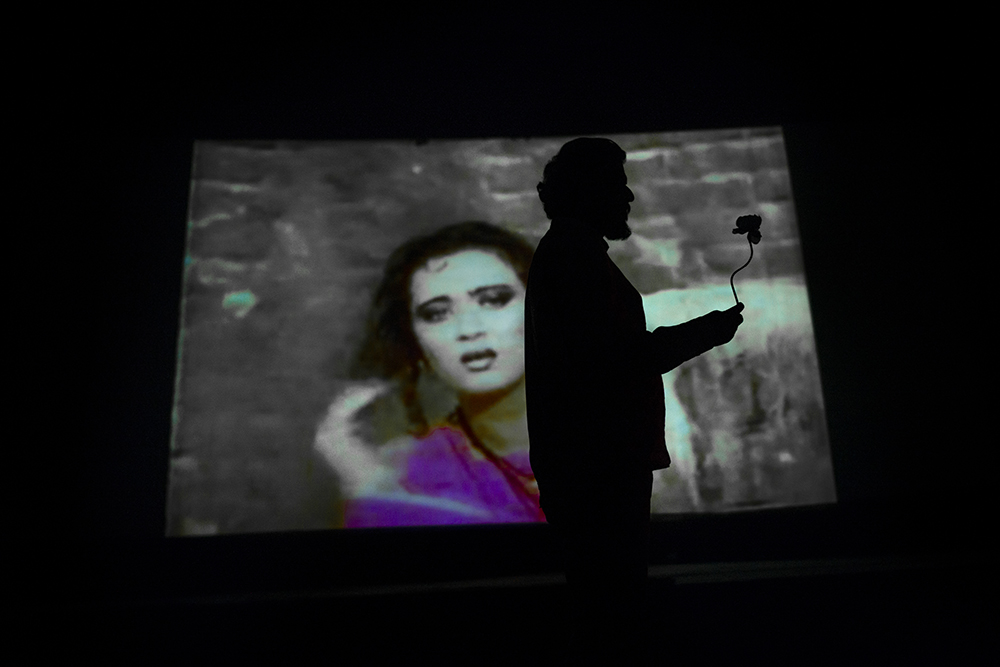
PAKISTAN / Lahore / 2017 / Noor grew up in a family of artists. His mother is a writer and his father was a painter. He spent his childhood surrounded among the intellectual friends of his parents and by books both from the subcontinent and the west. He is the only person I encountered who did not need to fight against a conservative religious family. From childhood he was free to be whom he wanted and this freedom was a mental bubble within a highly restrictive society. Nowadays he is a filmmaker, floating between a rich inner world populated by Tarkovsky or Abbas Kiarostami and the documentary work he does for a living. He might leave Pakistan for a while in order to find more opportunities.
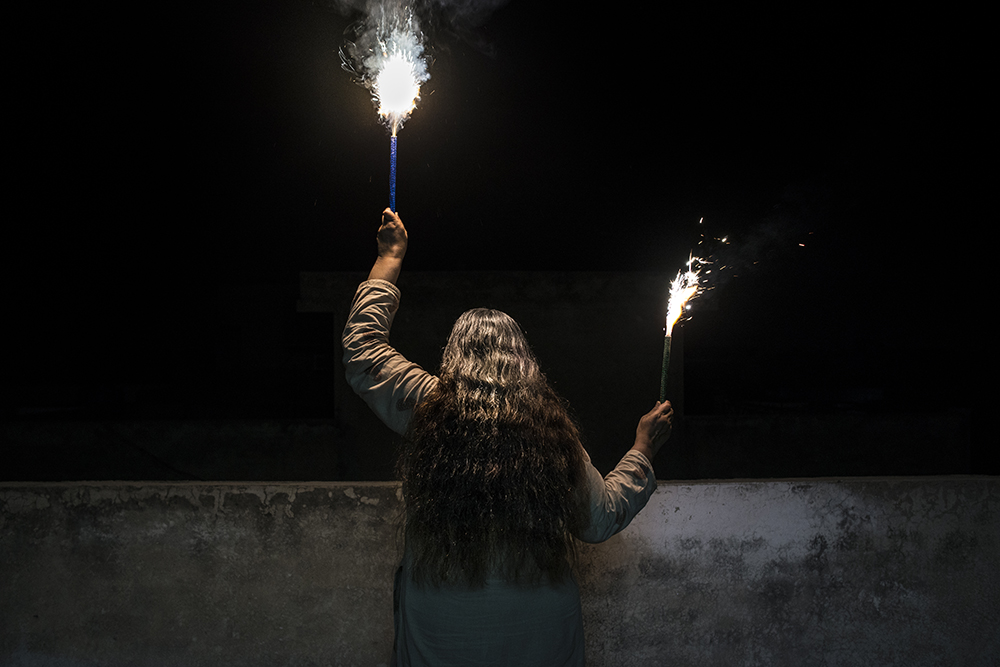
PAKISTAN / Lahore / 2017 / Noor is a fearless woman in her fifties. After the birth of her 3 children, she became an activist. “A peace activist” as she defines herself. She frequently organizes demonstration against the terrible events that happen regularly. Against the looting of a Christian colony, against discrimination, against the cutting of old trees along the main canal of Lahore, against blasphemy laws, against the persecution of the Ahmadi community, against the abduction of bloggers by the Pakistani state and very recently in memory of Mashal Khan who was lynched by an angry mob of fellow students in the premises of his university, on April 13, 2017, over fake allegations of posting blasphemous content online. She lives in a house full of sculptures of different deities like Buddha or Ganesha, Christ, etc. She listens to young people who feel different and lost or hopeless. She has received several death threats and spent some nights in police custody because of her protests. Sometimes she takes a spray and drives through the night to paint walls with peace slogans.
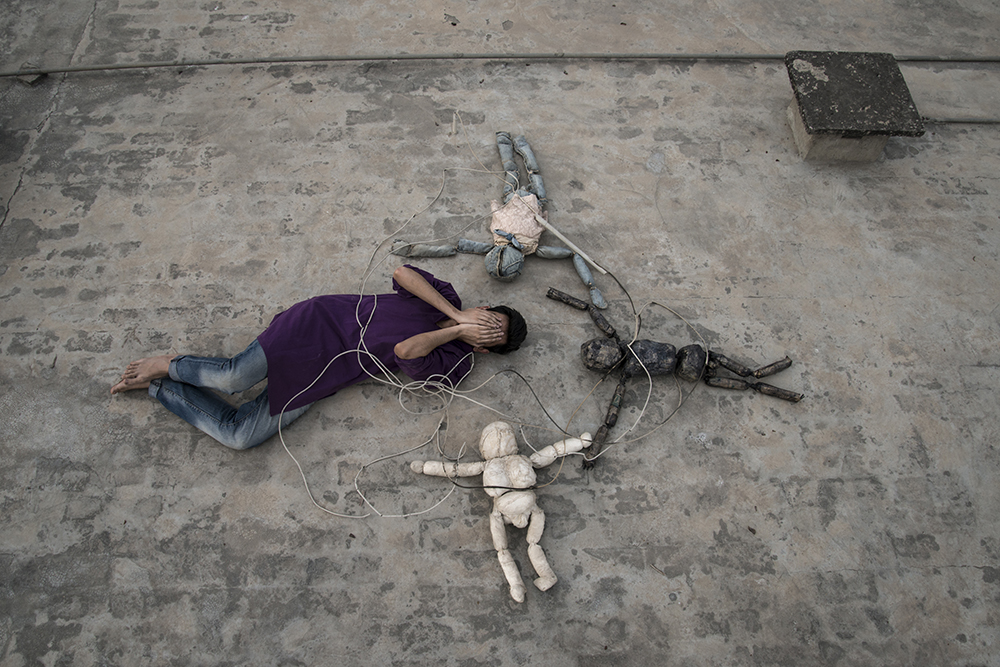
PAKISTAN / Lahore / 2017 / “I, the Native, the Muslim, the Gay, the Pakistani and finally the Artist. The perpetually angry man, refuting and relishing the fame and fear that comes with being reduced to a cliché. This is not a labor of love, but an inquisition of judgments and sweeping generalizations. Generalizations that stick to my skin like wet glue, a hundred men ejaculating their verdict all over me.”
Noor is a gay visual artist and more recently has declared himself to be a Muslim atheist. He lost his father at a young age, who was serving in the armed forces, to a skirmish in Baltistan, and was declared a “shaheed”. The word originates from the Quranic Arabic word meaning « witness » and is also used to denote a martyr. The word is used as an honorific for Muslims who have died fulfilling religious duties, especially those who die waging jihad, or historically in the military expansion of Islam. Within Islamic mythology a “shaheed” transcends death and cannot die.
In Pakistan the word has acquired more nationalistic sentiments and is used to legitimize the deaths of its officers by portraying them as martyrs, and creating a mythology around them using religion and state sponsored propaganda. After the loss of his father, Noor was informed that there was no need to mourn his father, as he was still alive, a statement, which would later in his life, helps him come to terms with the faith he was born into. In his teenage years Noor became aware of his attraction towards other boys. He fell passionately in love with a much older man who would eventually lead him into a religious cult and was the beginning of a painful romance. These experiences eventually allowed Noor to formulate a personal identity construct. Noor had once written, “there is a deep anger inside of me and a fire,” which much like the burdens of his identities, he carries inside of himself with great pride.
Noor pursued partial higher education in Europe with a thesis titled “Safety and the pursuit of the safe space,” which according to him “of all the utopian postulations, is perhaps the most dangerous idea of all. This idea instills within us visions of a just democratic state, a life void of suffering, and eternal bliss after death, and most importantly it forces us to selflessly commit our lives towards the realization of such delusional ideas.” Noor is back in Pakistan where he lives with his mother who knows that he is gay and fears for his safety. In order to spare her from further anguish, he keeps his atheism to himself. He currently has no lover, “I do not wish to be somebody’s dirty little secret”.
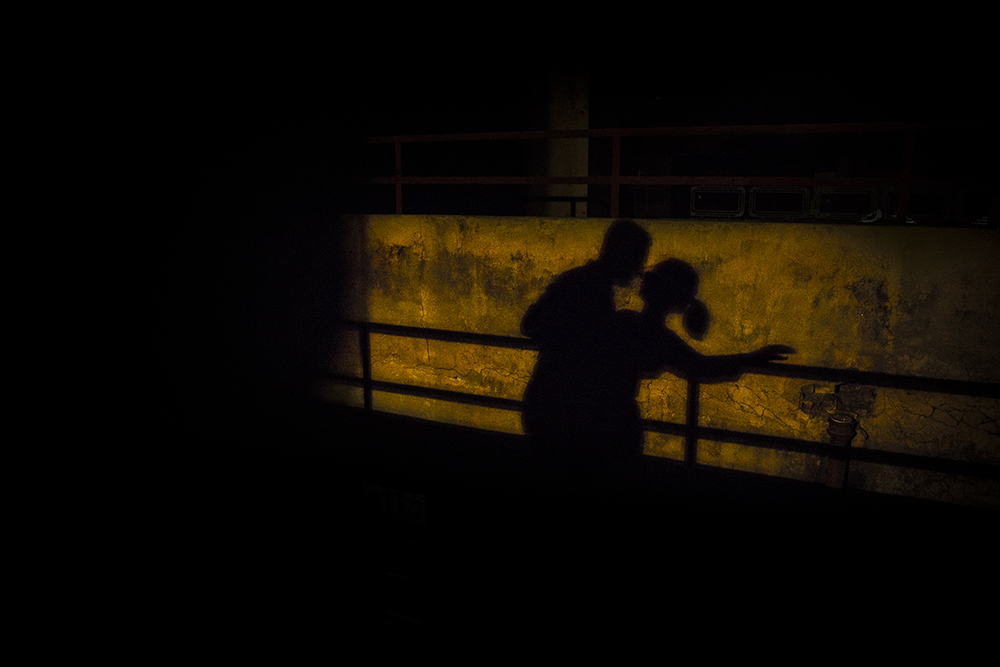
PAKISTAN / Lahore / 2017 / In 1977 under the military rule of late General Zia-ul-Haq, the Pakistani government decided to implement The Hudood Ordinances. It replaced parts of the British-era Pakistan Penal Code. The Hudood Law was intended to implement Sharia law or bring Pakistani law into « conformity with the injunctions of Islam », by enforcing punishments mentioned in the Quran for Zina. Zina relates to adultery or fornication – any extramarital sex – and is prohibited in Islam. If it has become more frequent for young people to date and sometimes have extra-marital sexual relationships, they need to be cautious and extremely discreet and they rarely live together outside marriage This picture is taken on the rooftop of a young couple. They got married a year ago but had been living together since the past 3 years. They belong to two different sects of Islam and they had to fight with many prejudices and discontent from their families. They both want to leave Pakistan.
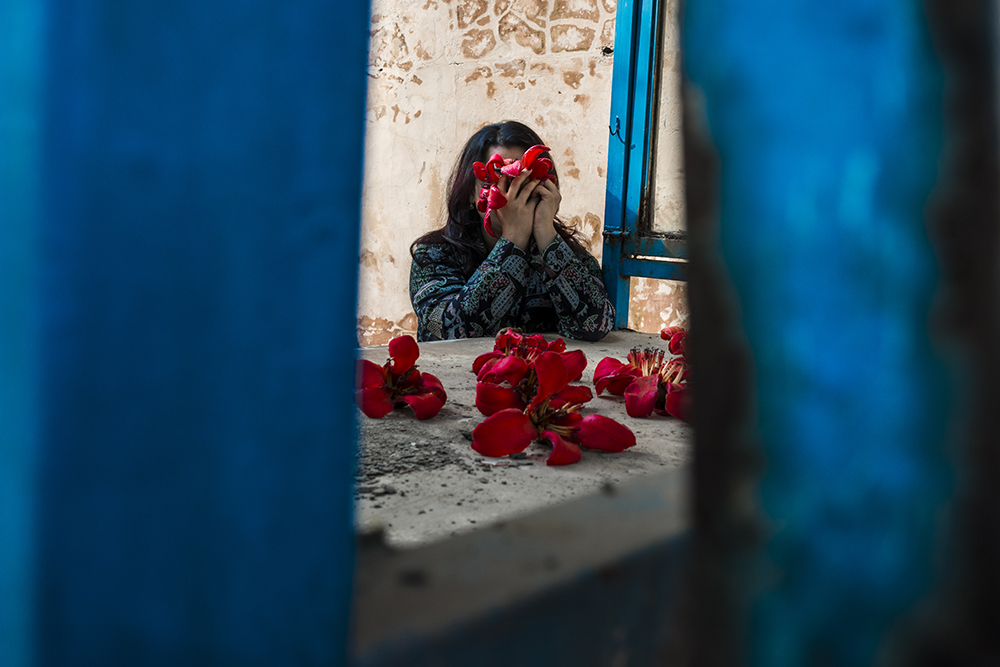
PAKISTAN / Lahore / 2017 / Noor is a well-read, witty, sensitive, bright young woman. She is unmarried. She never accepted any proposal and is unlikely to ever do so. Her marriage would be based on a lie. She is an atheist and she knows that it is unconceivable to announce it. She has to pretend all the time. “I am like a ghost among others. I have to constantly hide who I am”. She hopes to leave Pakistan.
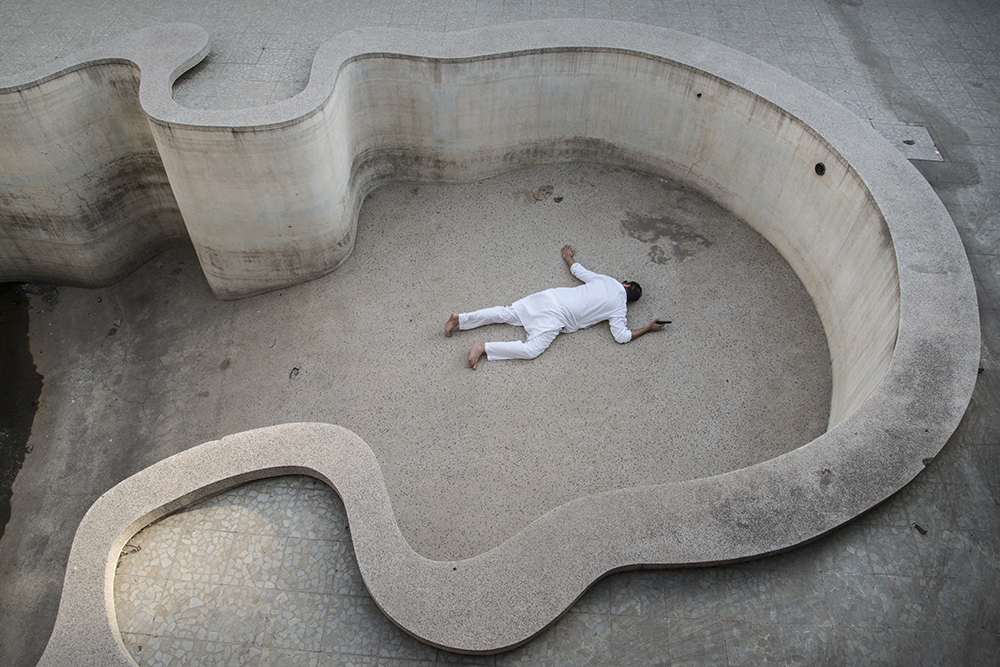
Pakistan/ Lahore / 2017 / Noor is the grand son of two legendary figures of the Pakistani cinema. He belongs to the Shia community but is a non-believer. He and his wife chose to give birth to their son in America so that he possesses an American passport and is never stuck in
Pakistan. He poses in an empty pool of a house that is soon to be destroyed and replaced by one more commercial mall. The miniature gun his hand is holding used to belong to a famous British actor. He is tired of a society that pratices hypocrisy on a daily basis out of all kind of social and religious fears. “I’m afraid of your fears because it is out of fear that you act most irrationally”, he said.
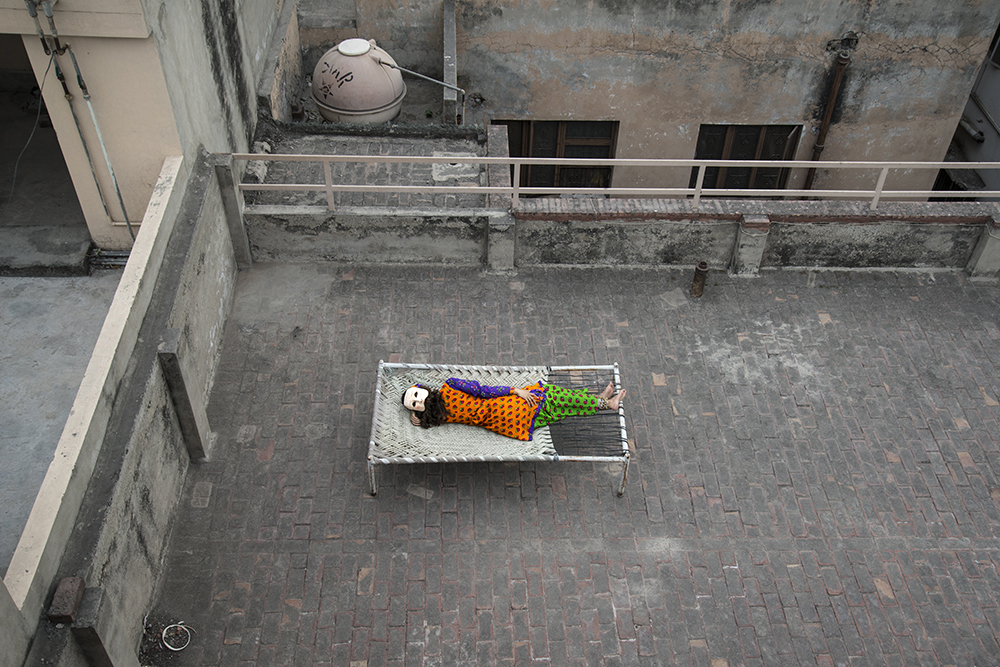
PAKISTAN / Lahore / 2017 / Dancing used to be part of life in Pakistan until the rise of military ruler Zia-ul-Haq in 1977 funded by the US during the cold war in an attempt to defeat the soviets in Afghanistan. In his policy towards a radical islamisation of society, he banned classical dance performances from the airwaves and cracked down on popular Kathak performers. Kathak is one of the major forms of Indian classical dance. Its origin is attributed to the travelling bards of ancient nothern India, known as Kathakars or storytellers. Nowadays, Kathak has gone virtually underground, with only a few remaining qualified instructors and even fewer public performances. Noor is a gorgeous woman who has decided to learn this dance. She considers herself “as the most beautiful creation of God” and likes to take pleasure in her beauty, her body and her sensuality. Despite being religious, she refuses to stay in the gray cage attributed to women by the clerics and the so-called public sense of decency.
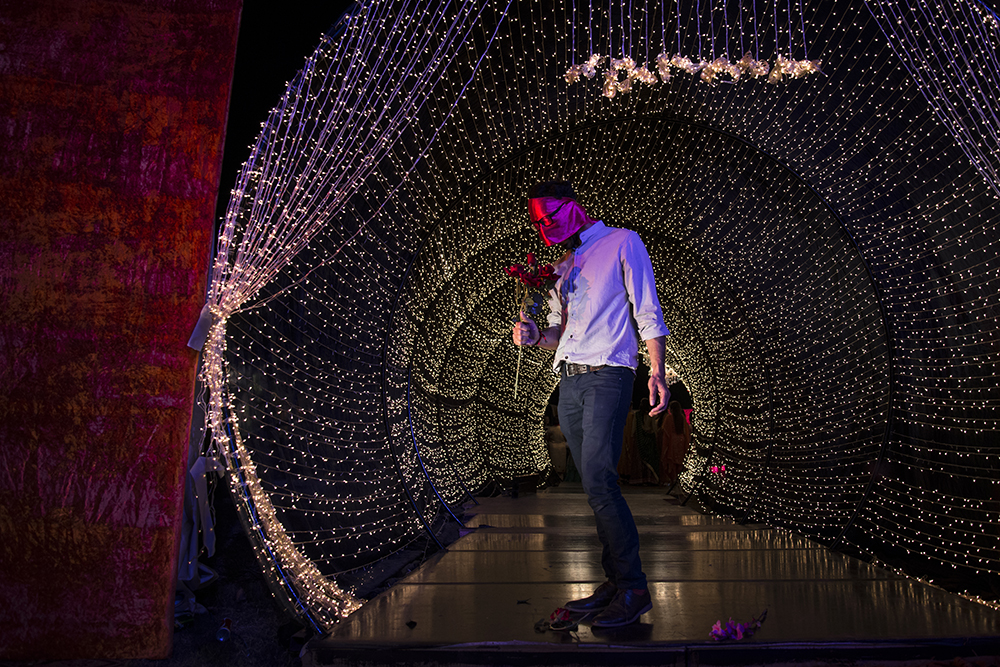
PAKISTAN / Lahore / 2017 / Noor is a musician in his thirties who moved to Lahore some years ago. To please his parents, he spent a while in England studying something he was not interested in. He left Pakistan heart broken and came back uncured. He almost surrendered to an arrange marriage but escaped this dead-end a week before the wedding. Earlier in his life he had tried to force himself to believe and to behave accordingly. He had even stopped playing the guitar and listening to music. All in vain since he is nowadays an atheist. He studied Marxism and was a social activist for a while but is slowly giving up because “everything is so screwed-up in this country. Nowadays he finds shelter and comfort in his passion for music. « The only thing that matters now is how to make my career in music, that’s all. And I am loving the whole process. »
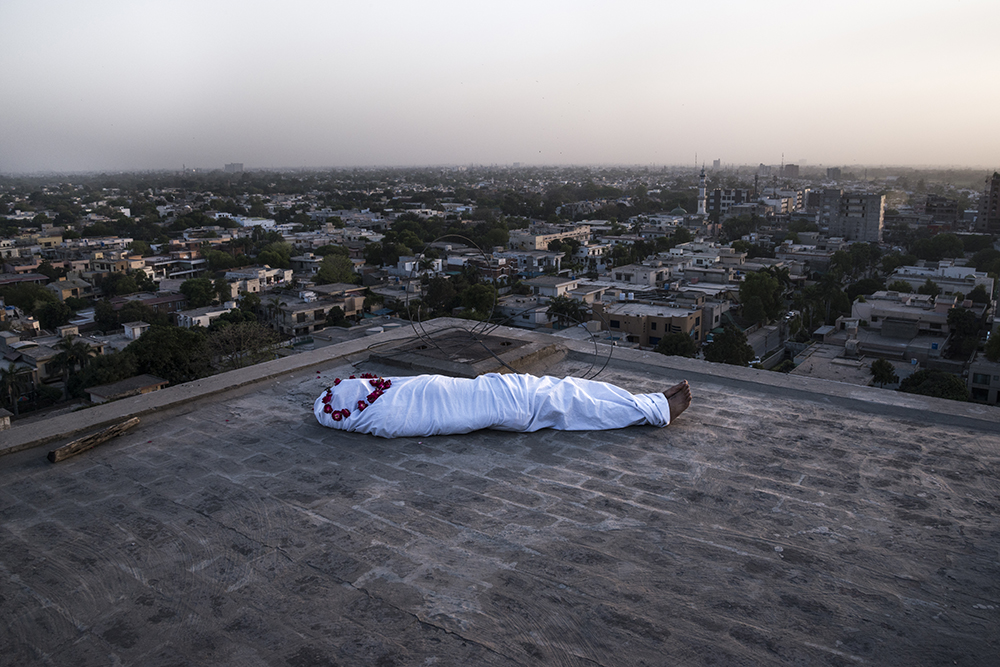
PAKISTAN / Lahore / 2017 / Noor has been a bright, curious, sharp-eyed child. In his teenage he found it more and more difficult to accept the omnipresent religious narrative and began to question it. He battled. He tried believing. In vain. More and more, his vivacity, his sexual urge, his observations throve him away from Islam. For example, he used to be attracted by sculptures and Islam was calling them idols and advocating their destruction. Nowadays he is an atheist without any doubt or regret. He is therefore also an apostate and this makes him “wajib-ul- qatal” (liable to be killed) according to some extremists. He knows that announcing apostasy means inviting the risk of death – even if spared by government authorities and courts, a fanatic mob would certainly not have mercy on him. For that reason, we choose to photograph him
wrapped in a shroud on the roof above a city that he loves and is sad to see being destroyed by corruption, religious intolerance, social indifference and a kind of feudal capitalism.
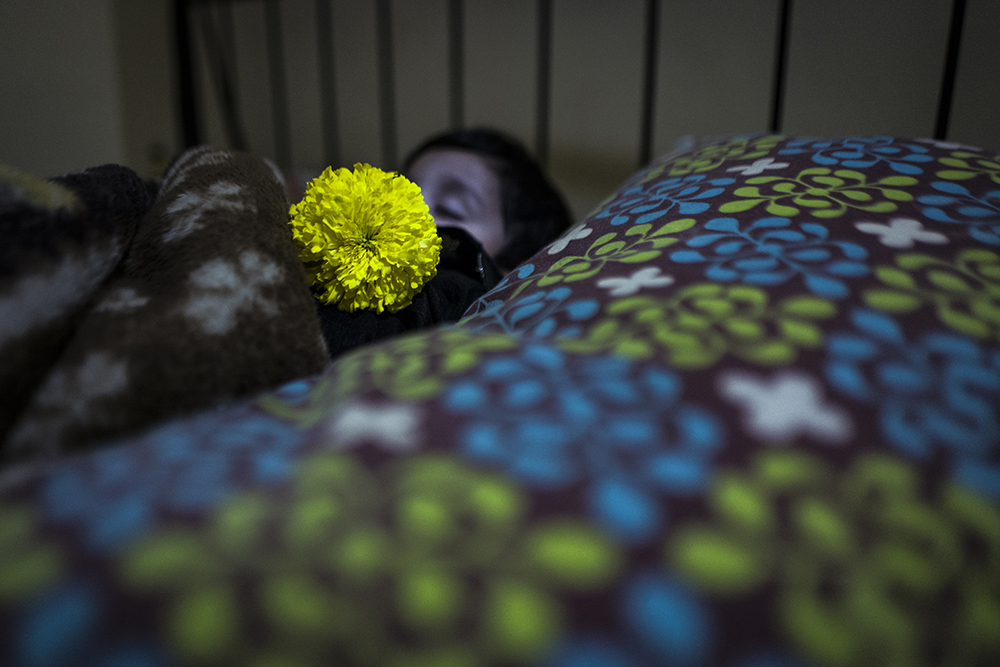
PAKISTAN / Lahore / 2017 / I encountered this little boy sleeping on a flowery quilt at a swinger party. In the recent years through the convenience of social media, parties are organized on weekends at some participant’s places and married couples of all ages gather. Some nights are wilder than others but some ingredients remain the same: Illegal booze (alcohol is forbidden in Pakistan and police is allowed to arrest people found with a bottle), dimmed lights, cautiously blinded windows and music welcome guests. Women wear transparent tops, men crack jokes and dance with each other’s wives. « We are doing what you do in the west when you are young. These parties have become essential. It is a moment solely for ourselves, we forget responsibilities and just want to have fun » says a guest. « Enjoying? Enjoying?” asks a tipsy man. « Enjoy but not to loudly. Children are sleeping in the next room », answers a woman. Furtive hands, dancing hips, deep laughter, mellowness, décolletage, music. A house in the sensual night of Lahore, a moment of innocence.
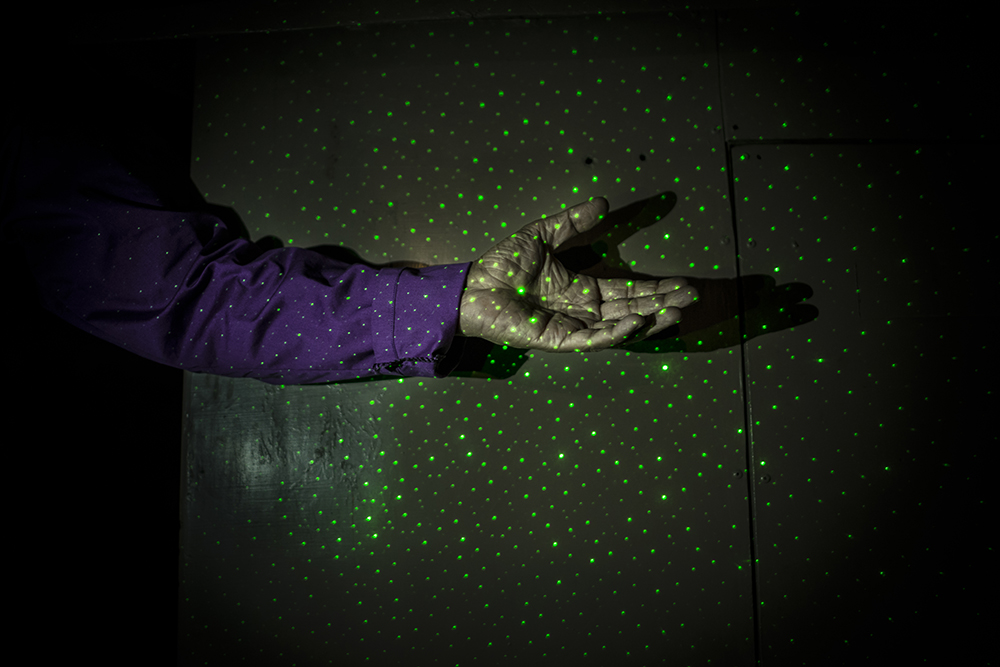
PAKISTAN / Lahore / 2017 / Noor exudes a gentle and dense sensuality as well as a sparking wit. He is a designer, a writer and offers drawing lessons. He loathes religion and the way people spend their life censuring themselves. He loves singing poetry, meeting friends. His hands dance when he speaks. He wishes he could move out of Pakistan and its repressive ideologies and epistemologies. But he does not fancy an exile in the west. Nepal could be a possibility. Elsewhere but close to his culture. “You know, we live in hell here”.


